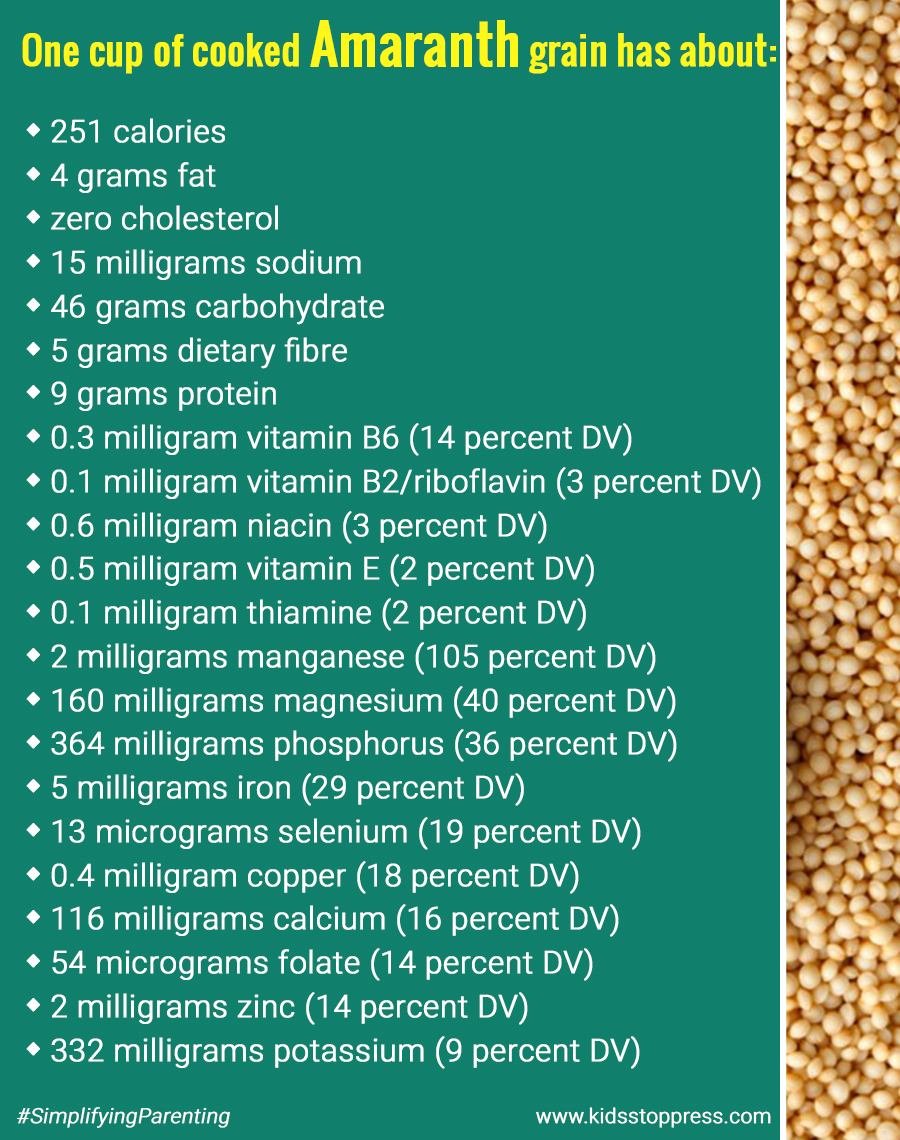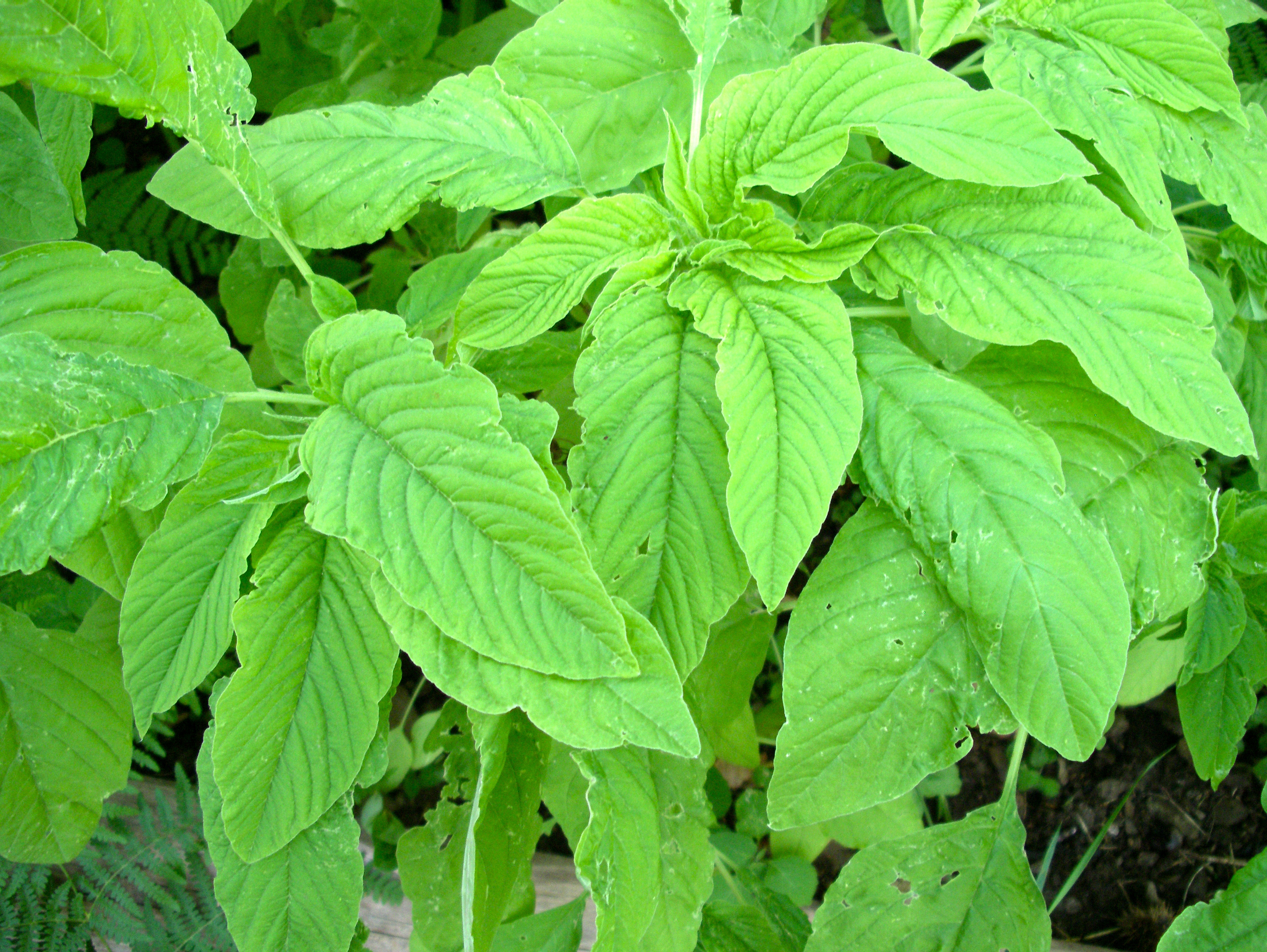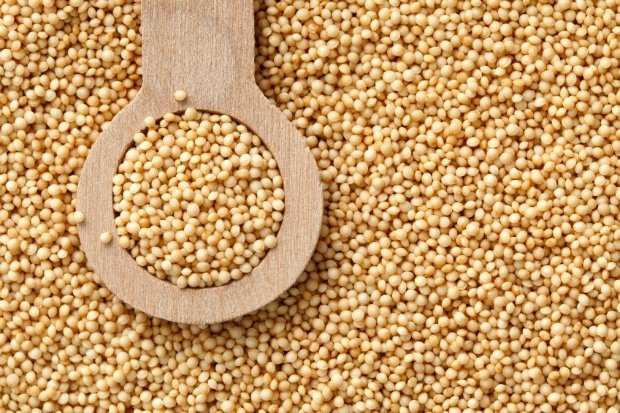Amaranth is the common name for more than 60 different species of Amaranthus. This gluten-free grain was a major food crop of the Aztecs. In India, it goes by different names – chaulia or cheera for people who eat its leaves, ramdana or rajgira for amaranth seeds.
You may also like: Don't Just Think Rice For Baby's Khichadi, Try These Super Nutritious Grains Too!
Due to the high proteins, minerals and vitamins present in amaranth, these ancient cultures depended on the grain as a major staple in their diets. Did you know that amaranth can be consumed as a leaf, cereal grain or grain flour? In fact, the amaranth leaf is used to make medicine, while the grain is used in food.
You may also like: Grandmom's Recipe ( Ep. 3) | Healthy Vegetarian Breakfast Recipe | Jowar Khichdi
Nutrients In Amaranth

Amaranth Nutrition Facts

Image Source: https://kitchengardennotebook.wordpress.com
Amaranth is a great source of protein, fibre, manganese, magnesium, phosphorus and iron. It will keep your digestive system regulated, build your strength, and reduce the risk of fracture or broken bones.
Why You Should Eat Amaranth
1. High Source of Protein
The protein contained in amaranth is of an unusually high quality. Protein foods are beneficial for preventing weight gain since they make us feel full and require more work for the body to digest than fast-acting refined carbohydrates.
2. Reduces Inflammation
Amaranth has the power to reduce inflammation, which is associated with just about every health condition. When dietary and environmental toxins build up in the body, the immune system becomes overactive, and it stimulates defence cells and hormones that damage tissues.
3. Bone Health
The calcium in amaranth grain allows the body to use this mineral for bone repair and strengthening. Including high-calcium foods in your daily diet is extremely important since it helps heal broken or weak bones
4. Lowers Cholesterol
Amaranth grain decreased very low-density LDL cholesterol (bad cholesterol) by 21 to 50 %. It also aids digestion by increasing frequency of bowel movements. This is due to the fibre content present in amaranth. The fibre binds cholesterol in the digestive system and causes it to be excreted by the body. Eating high-fibre foods helps the body lower cholesterol naturally.
5. Aids Digestive System
Because of amaranth’s high fibre content, it stimulates the digestive system and helps regulate the excretion of bodily waste. Due to its structure and our inability to absorb it, fibre passes through our digestive system unabsorbed by digestive enzymes within the stomach, taking with it toxins, waste, fat and cholesterol particles out of the gut.
You may also like: 10 Home Remedies To Relieve Constipation In Children
6. Fights Diabetes
With just a cup of amaranth providing over 100 percent the daily recommended dose of manganese, it serves as a diabetes preventer, and it helps reduce high blood sugar levels. Manganese is needed to help with the proper production of digestive enzymes.
7. It’s Gluten-Free
Amaranth is gluten-free, so people with sensitivities or intolerances to gluten are free to eat this beneficial grain. Gluten sensitivity is a cluster of symptoms related to a reaction to the protein found in the wheat plant called gluten. The severe form of gluten sensitivity is celiac’s disease, but gluten can also cause other less severe symptoms, such as joint pain, headaches, fatigue and poor memory. A gluten-sensitivity diet includes grains like amaranth, quinoa and nutritious buckwheat.
You may also like: Millet Recipes To Make Your Child's Meal Times Healthier And Merrier!
8. Excellent For Pregnant Women
The folate in amaranth helps the body make new cells, specifically by playing a role in copying and synthesizing DNA. For pregnant women, a folate deficiency can lead to neural tube defects such as spina bifida. A deficiency can also cause defects such as heart and limb malformations.
9. Aids Weight Loss
There are a number of reasons why consuming amaranth helps maintain a healthy and desired weight. It’s full of fibre, which keeps your digestive system regulated and reduces inflammation. It’s also a great source of protein, which keeps you full longer and increases endurance levels.
Word of Caution: Like other green leafy vegetables, amaranth leaves do contain moderate levels of oxalates. For this reason, if you suffer from kidney stones or gallstones, amaranth could exacerbate these conditions. Allergies to amaranth are rare, but they do occur occasionally. The allergic reaction will often occur within minutes, but it is rarely severe. Be sure to consult a medical professional before adding amaranth into your diet and consider undergoing an allergy panel to be sure.
We have two recipes for you (more in the pipeline) that you can make using the goodness of amaranth. Try them out and tell us how they turned out.
5 Grain Porridge

Amaranth Corn Fritter

Don’t forget to follow us on Facebook, Twitter, Pinterest, Soundcloud & Instagram or subscribe to our YoutubeChannel for more information.




















